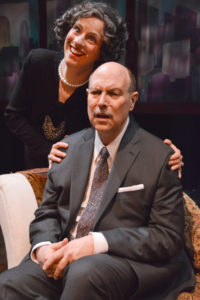by Stephen Houtz (Cosme McMoon in Souvenir)
 There are a few experiences that I have had in my life that can utterly change me; that can take me from where ever I am and put me in another world, another place, even another reality. A recent performance of the Mahler Symphony #5 by the Minnesota Orchestra was one of those moments.
There are a few experiences that I have had in my life that can utterly change me; that can take me from where ever I am and put me in another world, another place, even another reality. A recent performance of the Mahler Symphony #5 by the Minnesota Orchestra was one of those moments.
The Berg Violin Concerto in the first half was devastating for me. His inscription in that piece was “To the Memory of an Angel.” He had a specific angel in mind, and ironically, he died before he heard it, adding another angel to the collective memory. For me, the angel was my mother. I didn’t know if I would make it through the second half of the concert.
But since the Mahler was really what I came to hear, of course I stayed. From the very first notes, I was no longer there in my seat in the seventh row, but in a world made up of everything I had ever experienced with this piece. I am kind of a Mahler fanatic: I know and love every note. I no longer remembered where I was, or really who was playing: I was experiencing so much of my life. And in a way that I really can’t put into words. Or don’t want to put into words.
By the time the chorale came around in the final movement, I was weeping, but not from sadness. From experience. From having gone through an amazing journey.
 And the thing is, I do feel different. I know that I won’t be the person I was when I went into Orchestra Hall ever again. As I drove home, I thought about my week: a microcosm of my life, and how remarkable it is. I spent the week working on a production of High School Musical, Jr. with a group of kids. Now, even Mahler can’t make High School Musical into a transformative piece of theatre, but what it did is showed me these amazing kids that I get to work with, and share with. And that WILL transcend High School Musical. And I thought of all my students I worked with this week, and how I love working with each of them. Of how delighted I am as each one discovers something new or reaches a new artistic level. And how fortunate I am that I can be part of that. And I thought of the production of Putnam County Spelling Bee last night, and how amazed I was at the skill and joy in those kids’ performance. (And even of the surprise joy that I felt knowing that I had friends that would actually try to put me onstage.)
And the thing is, I do feel different. I know that I won’t be the person I was when I went into Orchestra Hall ever again. As I drove home, I thought about my week: a microcosm of my life, and how remarkable it is. I spent the week working on a production of High School Musical, Jr. with a group of kids. Now, even Mahler can’t make High School Musical into a transformative piece of theatre, but what it did is showed me these amazing kids that I get to work with, and share with. And that WILL transcend High School Musical. And I thought of all my students I worked with this week, and how I love working with each of them. Of how delighted I am as each one discovers something new or reaches a new artistic level. And how fortunate I am that I can be part of that. And I thought of the production of Putnam County Spelling Bee last night, and how amazed I was at the skill and joy in those kids’ performance. (And even of the surprise joy that I felt knowing that I had friends that would actually try to put me onstage.)
 And I think about what I get to do this weekend: to perform in a wonderful show about a woman who so believed in the transformative power of music that she performed against all odds, and won my character over by teaching him how to experience music—and the world—the way she did. She says in the last part of the show, “If only we could live in the music forever, Cosme. If only it would go on and on.”
And I think about what I get to do this weekend: to perform in a wonderful show about a woman who so believed in the transformative power of music that she performed against all odds, and won my character over by teaching him how to experience music—and the world—the way she did. She says in the last part of the show, “If only we could live in the music forever, Cosme. If only it would go on and on.”
And for me, tonight, and for the rest of my life, the music will go on and on.







